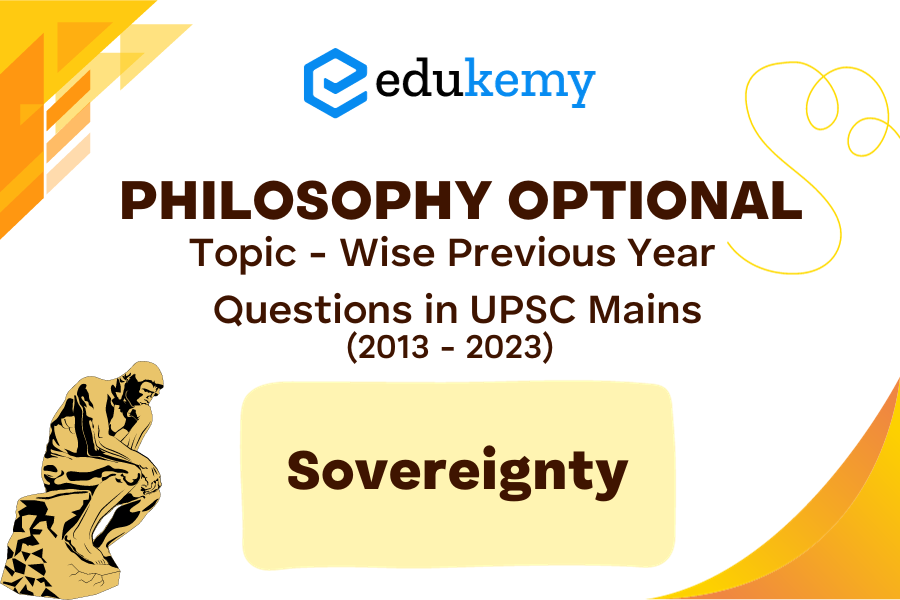
Are you an aspiring civil servant preparing for the UPSC Mains examination with philosophy as your optional subject? If so, you’re in for an intellectual treat as we delve into the crucial topic of “Sovereignty.” In this blog series, we’ll be exploring a curated selection of previous year questions from 2013 to 2023 to help you master this topic and excel in your philosophy optional paper. Sovereignty is a foundational concept in political philosophy and a recurring theme in the UPSC Mains examination. By examining past questions and delving into the intricacies of sovereignty, we aim to equip you with the knowledge and insights needed to approach this subject with confidence and finesse.
Through a comprehensive analysis of these questions, we’ll uncover the evolving perspectives on sovereignty, allowing you to better grasp the nuances of this topic. Whether you’re a philosophy enthusiast or simply seeking to enhance your understanding of political thought, this blog series will be your guiding light on the path to success in the UPSC Mains examination. So, let’s embark on this philosophical journey together and unlock the wisdom of past years to conquer the sovereignty topic in UPSC Mains.
Contents
- 1 Sovereignty Philosophy – Previous Year Questions (UPSC CSE Mains History Optional)
- 2 FAQs on Sovereignty
- 2.1 Q: What is the significance of studying sovereignty in philosophy for UPSC Mains?
- 2.2 Q: What are the core philosophical perspectives on sovereignty?
- 2.3 Q: How has the concept of sovereignty evolved in contemporary political thought?
- 2.4 Q: What are some practical examples of sovereignty in today’s world?
- 2.5 Q: Are there any recommended philosophers or texts for a deeper understanding of sovereignty in philosophy?
- 3 In case you still have your doubts, contact us on 9811333901.
Sovereignty Philosophy – Previous Year Questions (UPSC CSE Mains History Optional)
1. Discuss whether Kautilya’s concept of sovereignty turns into adespotic rule. How far is it comparable to Bodin’s concept ? Discuss(2017/15)
2. Explain Harold Laski’s critique of sovereignty.(2015/10)
3. Explain the significance of John Austin’s theory of sovereignty. Howdoes it differ from that of Hobbes ? (2014/10)
4. Who amongst Austin , Bodin and Laski is the most consistent in hisanalysis of the concept of sovereignty ? (2012/12)
5. Compare and contrast Kautilya’s Saptanga Theory of the SovereignState with Bodin’s theory of Sovereignty. 2011 – 15 marks
6. Why did Kautilya think that sovereignty is hierarchical? Explain.2010 – 15 marks.
7. Does Bodin’s theory of sovereignty float in the air? Criticallyexamine. 2010 – 20 marks.
8. Compare Bodin’s and Austin’s views on sovereignty. 2009 – 20marks.
9. Critically examine Kautilya’s saptang theory of sovereign state. 2008 – 20 marks.
10. Explain the notion of sovereignty. Critically consider in this contextthe claim that sovereignty is illimitable and logically indivisible.2006 – 60 marks.
FAQs on Sovereignty
Q: What is the significance of studying sovereignty in philosophy for UPSC Mains?
A: Understanding sovereignty is crucial as it forms the basis of political and ethical discussions. It’s essential for candidates to grasp this concept as it’s frequently examined in UPSC Mains, helping them score well in the exam.
Q: What are the core philosophical perspectives on sovereignty?
A: Sovereignty has been viewed through various philosophical lenses. Candidates often wonder about the major philosophical viewpoints and how they’ve evolved over time, which is vital for answering questions effectively.
Q: How has the concept of sovereignty evolved in contemporary political thought?
A: UPSC questions often demand knowledge of contemporary discussions on sovereignty. Candidates frequently inquire about the shifts and developments in this concept, especially regarding globalization and international relations.
Q: What are some practical examples of sovereignty in today’s world?
A: As sovereignty isn’t just a theoretical concept, candidates often seek real-world examples. Being able to provide contemporary instances of sovereignty in action is beneficial for a well-rounded answer.
Q: Are there any recommended philosophers or texts for a deeper understanding of sovereignty in philosophy?
A: Aspirants may want to know about key philosophers or books to study in-depth to enhance their grasp of sovereignty. Having a list of recommended readings or philosophers can be extremely helpful.
In case you still have your doubts, contact us on 9811333901.
For UPSC Prelims Resources, Click here
For Daily Updates and Study Material:
Join our Telegram Channel – Edukemy for IAS
- 1. Learn through Videos – here
- 2. Be Exam Ready by Practicing Daily MCQs – here
- 3. Daily Newsletter – Get all your Current Affairs Covered – here
- 4. Mains Answer Writing Practice – here

